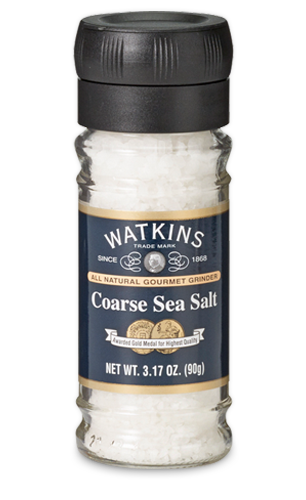Which Is Better Natural Sea Salt or Table Salt?
 Have you been wondering, “Which is better, natural sea salt or regular table salt? Perhaps you haven’t given it any though
Have you been wondering, “Which is better, natural sea salt or regular table salt? Perhaps you haven’t given it any though
Maybe you’ve heard that natural sea salt is a healthier alternative to common table salt? Perhaps you’ve seen sea salt used by gourmet chefs on cooking shows and in restaurants. But is there really a difference? Does it taste better or is it healthier?
Well there are most definitely differences, and many would argue that sea salt is healthier due to the minimal processing and lack of refinement it undergoes. Others maintain that the only difference is taste. So let’s take a look at some of the claims and real differences between these two kinds of salt.
Sodium Chloride
Sodium chloride is sodium chloride, and most people associate the term “salt” with this chemical compound. While both sea and table salt contain sodium chloride, table salt contains no other minerals. Table salt does, however, usually have additives such as iodine.
Sea salt does not have anything added to it, but it contains varying amounts of natural trace minerals and other constituents.
The Origins of Sea Salt and Table Salt
Sea salt is obtained by simply evaporating sea water; once the water is gone, the salty deposits are left behind. Table salt, on the other hand, is mined from underground, and is “purified” by heat blasting or chemical treatments so it only contains sodium chloride before anti-caking agents such as calcium silicate or silicon dioxide (sand), as well as dextrose (sugar), and iodine are added. There are concerns that the ocean water used to make sea salt may contain impurities, or that sea salt is not healthier due to potentially polluted ocean waters.
Balancing Components
Excessive intake of sodium can cause health problems such as high blood pressure, but it is worth noting that sea salt has some components that may help balance out any harmful effects from the sodium chloride it contains. Another example, excessive sodium consumption can lead to inhibited calcium absorption by increasing the secretion of calcium in the urine.
This implicates excessive sodium chloride intake as a contributing factor in osteoporosis and other calcium-deficient disorders. But sea salt actually contains calcium and magnesium, helping to replace whatever of those minerals may be lost through urination. Plus the magnesium sea salt contains promotes calcium absorption.
Flavor
You may find that there is a distinctive difference in the taste of sea salt compared to table salt. Recipes, in fact, have been known to turn out “too salty” when common table salt was used instead of the sea salt called for in the recipe. This is probably due to the fact that sea salt contains minerals that do not taste salty such as calcium, magnesium, iron, etc.
Many people simply choose sea salt because they prefer to eat foods that are less refined on principle. Still others may choose table salt because they know how it “measures” in recipes, or to be sure they obtain enough iodine. Those who choose sea salt may obtain iodine through other dietary means, or by taking kelp tablets.
Feel free to tell us… Which do you prefer, sea or table salt?






No Comments Yet.